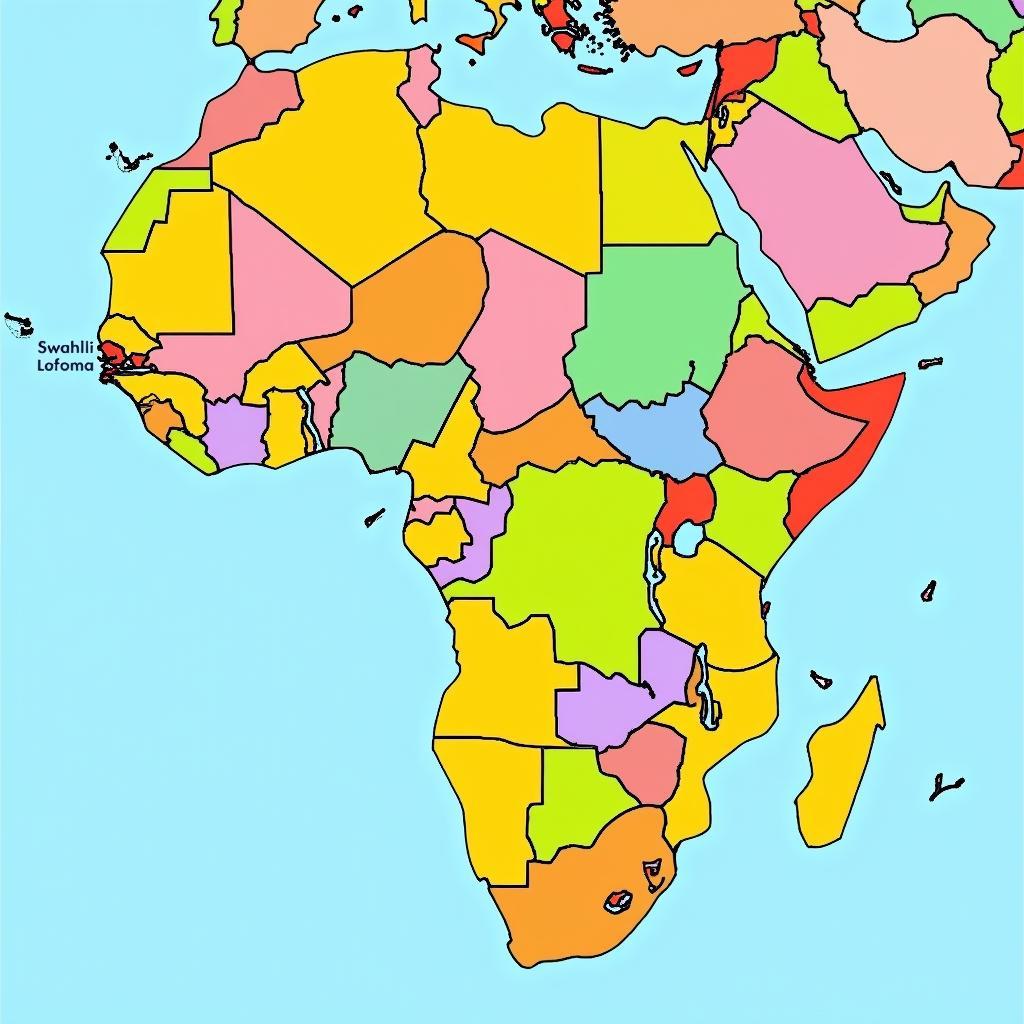Which African Countries Speak Swahili?
Swahili, a vibrant and melodic language, echoes across the African continent, serving as a unifying force for millions. While often associated with East Africa, the reach of Swahili extends further than many realize. So, which African Countries Speak Swahili? Let’s delve into the heart of Africa and discover the nations where Swahili holds a place of prominence.
Swahili’s East African Stronghold
East Africa stands as the undisputed heartland of the Swahili language. Here, Swahili serves not only as a common tongue but also as an official language in several nations.
- Tanzania: With over 50 million speakers, Tanzania boasts the largest Swahili-speaking population globally. In fact, Swahili is the official language of Tanzania and plays a vital role in education, government, and daily life.
- Kenya: Kenya embraces Swahili as both a national and official language, alongside English. It’s used extensively in government, media, and education, fostering national unity.
- Uganda: While not as widely spoken as in Tanzania or Kenya, Uganda recognizes Swahili as an official language. Its use is growing, particularly in government and security forces.
These three East African nations form the core of the Swahili-speaking world, but the language’s influence doesn’t end there.
Beyond the Core: Where Swahili Finds a Home
Swahili’s melodic tones and rich vocabulary have transcended national borders, finding their way into the cultural fabric of several other African nations.
- Democratic Republic of Congo (DRC): Swahili enjoys widespread use in the eastern regions of the DRC, serving as a vital lingua franca for trade and communication.
- Burundi: Although French and Kirundi hold official status, Swahili is gaining traction in Burundi, particularly in border regions and within the business community.
- Rwanda: While Kinyarwanda dominates, Swahili is increasingly spoken in Rwanda, especially in refugee communities and for cross-border trade.
- South Sudan: As the newest nation in Africa, South Sudan is home to a diverse linguistic landscape. Swahili is used in some areas, particularly in trade and by people who have migrated from neighboring countries.
 Map of East Africa
Map of East Africa
Why is Swahili Spoken in So Many African Countries?
The presence of Swahili across such a vast expanse of Africa raises a question: how did it become so widespread?
- Trade and Commerce: For centuries, Swahili flourished as the language of trade along the East African coast. As traders ventured inland, they carried their language, facilitating communication and fostering cultural exchange.
- Colonial Influence: During the colonial era, European powers often used Swahili as a lingua franca for administration and communication. This policy, while rooted in colonial agendas, contributed to the language’s spread.
- Post-Colonial Unity: Following independence, many African nations adopted Swahili as a unifying language, seeking to transcend ethnic and linguistic divisions.
- Cultural Exchange: The popularity of Swahili music, films, and literature has also played a role in its diffusion, introducing the language to new audiences across the continent.
Swahili: A Language of Connection and Culture
Swahili, more than just a language, embodies the spirit of connection and cultural exchange that defines Africa. From the bustling marketplaces of Tanzania to the vibrant music scenes of Kenya, Swahili weaves its way into the tapestry of daily life. As Africa continues to evolve, Swahili stands poised to play an even greater role, fostering unity and understanding across the continent.
FAQs About Swahili in Africa
1. Is Swahili difficult to learn?
Swahili is considered relatively accessible for English speakers, with consistent pronunciation and grammar rules.
2. What is the best way to learn Swahili?
Immersion is ideal, but language courses, online resources, and cultural exchanges can also be effective.
3. Are there different dialects of Swahili?
Yes, various dialects exist, with the dialect spoken in Zanzibar often considered the most prestigious.
4. What are some common Swahili phrases to know?
- “Jambo!” (Hello!)
- “Habari?” (How are you?)
- “Asante sana” (Thank you very much)
5. What is the future of Swahili in Africa?
Swahili’s future appears bright, with its growing use in education, media, and diplomacy, cementing its role as a vital language for communication and cultural exchange in Africa.
For more insights into African languages and culture, explore our articles on African dance quotes and African accent translator.
Need assistance? Contact us at +255768904061, email [email protected], or visit us in Mbarali DC Mawindi, Kangaga, Tanzania. Our dedicated customer service team is available 24/7 to assist you.

